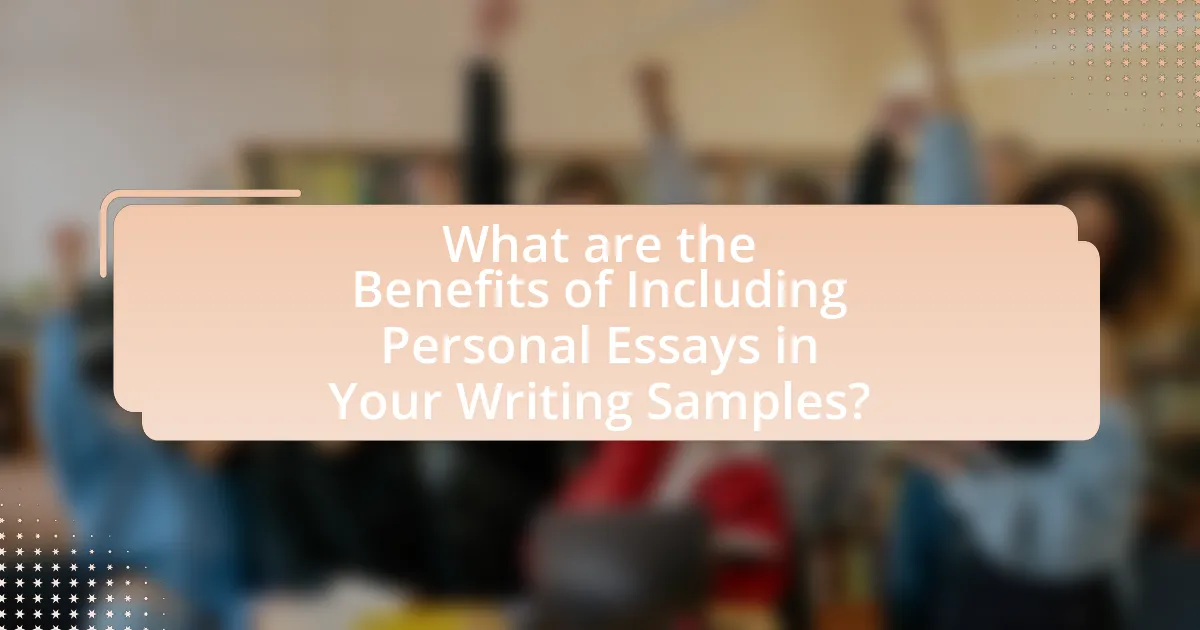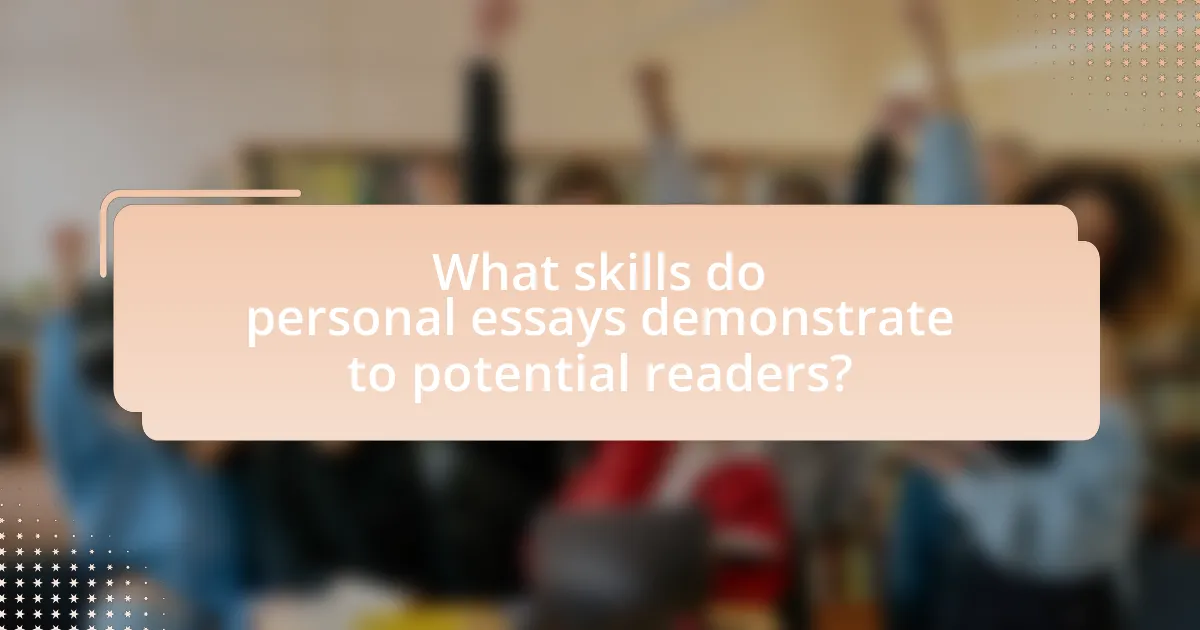The article explores the benefits of including personal essays in writing samples, emphasizing their role in enhancing authenticity and showcasing an individual’s unique voice. Personal essays allow writers to convey their perspectives and storytelling abilities, fostering deeper connections with readers through emotional engagement. The article discusses how personal essays improve writing portfolios, illustrate critical thinking and emotional intelligence, and appeal to specific audiences by addressing universal themes. Additionally, it outlines effective techniques for crafting personal essays and highlights best practices for ensuring authenticity and reader engagement.

What are the Benefits of Including Personal Essays in Your Writing Samples?
Including personal essays in writing samples enhances authenticity and showcases individual voice. Personal essays allow writers to demonstrate their unique perspectives and storytelling abilities, which can resonate more deeply with readers. Research indicates that personal narratives can evoke empathy and connection, making them effective tools for engaging an audience. For instance, a study published in the journal “Psychological Science” found that personal stories can significantly increase emotional engagement, leading to a stronger impact on the reader. Thus, incorporating personal essays not only highlights a writer’s skills but also fosters a more relatable and compelling narrative.
How do personal essays enhance your writing portfolio?
Personal essays enhance a writing portfolio by showcasing an individual’s unique voice and perspective, which can attract potential clients or employers. These essays demonstrate the writer’s ability to engage readers through personal storytelling, emotional resonance, and reflective insights. According to a study by the National Council of Teachers of English, personal narratives can significantly improve writing skills by fostering creativity and critical thinking. This evidence supports the notion that including personal essays in a portfolio not only highlights a writer’s versatility but also their capacity to connect with audiences on a deeper level.
What unique perspectives do personal essays provide?
Personal essays provide unique perspectives by offering intimate insights into individual experiences and emotions. These essays allow writers to express their personal truths, fostering a deeper connection with readers through relatable narratives. Research indicates that personal storytelling enhances empathy and understanding, as evidenced by studies showing that narratives can significantly influence attitudes and perceptions (Green & Brock, 2000). By sharing personal anecdotes, writers can illuminate broader societal issues, making complex topics more accessible and engaging for their audience.
How do personal essays showcase your voice and style?
Personal essays showcase your voice and style by allowing you to express your unique perspective and emotional authenticity. Through personal anecdotes, specific language choices, and narrative techniques, writers convey their individuality and thought processes. For instance, the use of first-person narration creates intimacy, while varied sentence structures can reflect the writer’s personality. This distinctiveness is supported by the fact that personal essays often prioritize personal experience over objective reporting, making the writer’s voice central to the narrative.
Why are personal essays important for different writing contexts?
Personal essays are important for different writing contexts because they provide a unique blend of personal experience and reflective insight, which enhances the authenticity and relatability of the writing. This authenticity fosters a deeper connection with readers, making the content more engaging and impactful. For instance, in academic settings, personal essays can illustrate theoretical concepts through real-life examples, thereby facilitating better understanding. In professional contexts, they can showcase an individual’s voice and perspective, which is crucial for personal branding and establishing credibility. Research indicates that personal narratives can significantly improve reader engagement, as evidenced by studies showing that stories evoke emotional responses, leading to increased retention of information.
How do personal essays appeal to specific audiences?
Personal essays appeal to specific audiences by leveraging relatable experiences and emotional resonance. These essays often explore universal themes such as identity, struggle, and growth, which can connect deeply with readers who share similar backgrounds or challenges. For instance, a personal essay discussing overcoming adversity can resonate with individuals facing their own hardships, fostering a sense of empathy and understanding. Research indicates that narratives that evoke emotional responses are more likely to engage readers, as demonstrated by a study published in the journal “Psychological Science,” which found that emotionally charged stories enhance memory retention and audience connection. Thus, personal essays effectively attract and engage targeted audiences through shared experiences and emotional depth.
What role do personal essays play in creative versus academic writing?
Personal essays serve distinct roles in creative and academic writing. In creative writing, personal essays allow authors to express individual experiences, emotions, and reflections, fostering a connection with readers through storytelling and personal voice. This genre emphasizes subjective interpretation and artistic expression, as seen in works by authors like Joan Didion, who use personal narratives to explore broader societal themes.
In contrast, personal essays in academic writing function to illustrate theoretical concepts through personal experience, providing a practical context for abstract ideas. They enhance the credibility of arguments by grounding them in real-life examples, as demonstrated in scholarly works that incorporate personal anecdotes to support research findings. This dual role of personal essays enriches both creative and academic writing by blending personal insight with broader themes and scholarly rigor.

What skills do personal essays demonstrate to potential readers?
Personal essays demonstrate skills such as self-reflection, narrative construction, and emotional intelligence to potential readers. These essays require the writer to analyze personal experiences, articulate thoughts clearly, and engage readers through storytelling. For instance, a well-crafted personal essay often showcases the ability to connect personal anecdotes with broader themes, illustrating the writer’s capacity for critical thinking and empathy. This combination of skills not only enhances the writer’s credibility but also fosters a deeper connection with the audience, making personal essays a valuable addition to writing samples.
How do personal essays reflect your critical thinking abilities?
Personal essays reflect critical thinking abilities by showcasing the writer’s capacity to analyze experiences, draw connections, and articulate insights. Through the process of reflecting on personal experiences, writers engage in self-examination, which requires evaluating their thoughts and emotions critically. This introspection allows them to identify underlying themes and lessons, demonstrating their ability to synthesize information and present coherent arguments. For instance, a personal essay that discusses overcoming a challenge illustrates not only the event but also the thought processes involved in navigating that situation, revealing the writer’s analytical skills.
What techniques can you use to convey complex ideas in personal essays?
To convey complex ideas in personal essays, utilize techniques such as narrative storytelling, analogies, and clear structure. Narrative storytelling engages readers by presenting complex ideas through relatable experiences, making them easier to understand. For instance, using a personal anecdote to illustrate a broader theme can clarify intricate concepts. Analogies simplify complex ideas by comparing them to familiar situations, allowing readers to grasp the essence without getting lost in technical details. A clear structure, including an introduction, body, and conclusion, helps organize thoughts logically, guiding readers through the argument and enhancing comprehension. These techniques are effective because they transform abstract concepts into tangible experiences, facilitating better understanding and retention.
How do personal essays illustrate your emotional intelligence?
Personal essays illustrate emotional intelligence by showcasing the author’s ability to reflect on personal experiences and understand their emotional impact. Through narrative storytelling, writers convey vulnerability, empathy, and self-awareness, which are key components of emotional intelligence. For instance, a personal essay that discusses overcoming adversity often reveals the author’s insights into their emotions and the emotions of others involved, demonstrating an understanding of complex emotional dynamics. This reflective process not only enhances the writer’s emotional depth but also allows readers to connect on a personal level, fostering empathy and understanding.
What writing techniques are effectively showcased in personal essays?
Personal essays effectively showcase techniques such as narrative storytelling, vivid imagery, and emotional resonance. Narrative storytelling allows writers to convey personal experiences in a structured manner, engaging readers through a clear beginning, middle, and end. Vivid imagery enhances the reader’s experience by painting detailed pictures that evoke sensory responses, making the narrative more relatable and immersive. Emotional resonance connects the writer’s experiences to universal themes, fostering empathy and understanding among readers. These techniques are validated by the prevalence of personal essays in literary journals and educational settings, where they are used to illustrate the power of personal voice and reflection in writing.
How can narrative structure enhance the impact of personal essays?
Narrative structure enhances the impact of personal essays by providing a coherent framework that guides readers through the author’s experiences and emotions. This structure allows for the development of a clear beginning, middle, and end, which helps to engage readers and create a sense of progression. For instance, a well-structured narrative can evoke empathy by illustrating personal growth or transformation, making the essay more relatable and memorable. Research indicates that stories with a strong narrative arc are more effective in conveying messages and eliciting emotional responses, as they facilitate better retention of information and connection with the audience.
What stylistic choices can elevate your personal essay writing?
Incorporating vivid imagery, authentic voice, and varied sentence structure can significantly elevate personal essay writing. Vivid imagery engages readers by painting clear pictures in their minds, making experiences relatable and memorable. An authentic voice establishes a connection with the audience, allowing them to feel the writer’s emotions and perspectives, which enhances the essay’s impact. Additionally, varied sentence structure maintains reader interest and improves the flow of the narrative, preventing monotony. Research indicates that essays employing these stylistic choices tend to resonate more with readers, as they create a more immersive and engaging experience.

How can you effectively incorporate personal essays into your writing samples?
To effectively incorporate personal essays into your writing samples, select essays that showcase your unique voice and perspective while aligning with the themes of the writing samples you are presenting. Personal essays can illustrate your ability to engage readers through storytelling, emotional depth, and reflective insights, which are essential qualities in various writing contexts. For instance, a personal essay about overcoming a challenge can demonstrate resilience and creativity, making it relevant for applications in fields such as journalism or creative writing. Additionally, including personal essays can enhance your portfolio by providing a diverse range of writing styles and topics, thereby appealing to a broader audience.
What strategies can you use to select the right personal essay for your portfolio?
To select the right personal essay for your portfolio, prioritize essays that showcase your unique voice and experiences. Focus on essays that highlight significant life events or insights, as these resonate more with readers and demonstrate your ability to reflect critically. Additionally, consider the relevance of the essay to your intended audience or purpose; essays that align with the themes or topics you wish to explore further will strengthen your portfolio. Lastly, seek feedback from peers or mentors to identify which essays effectively convey your strengths and storytelling abilities, ensuring that the selected pieces represent your best work.
How do you tailor personal essays to fit specific writing opportunities?
To tailor personal essays to fit specific writing opportunities, writers should first analyze the guidelines and themes of the opportunity. This involves identifying key elements such as the target audience, required tone, and specific prompts or questions posed by the opportunity. For instance, if a publication seeks personal narratives that emphasize resilience, the writer should focus on experiences that highlight overcoming challenges, ensuring that the essay aligns with the publication’s mission and audience expectations.
Additionally, incorporating relevant anecdotes and adjusting the writing style to match the desired voice of the platform enhances the essay’s suitability. Research shows that essays tailored to specific audiences have a higher acceptance rate, as they resonate more effectively with readers and editors. By aligning personal experiences with the thematic focus of the opportunity, writers can create compelling essays that stand out in competitive submissions.
What common pitfalls should you avoid when including personal essays?
When including personal essays, avoid the pitfalls of excessive self-indulgence, lack of focus, and poor editing. Excessive self-indulgence can alienate readers; personal essays should resonate with a broader audience rather than serve solely as a platform for personal grievances. Lack of focus can dilute the message; a clear theme or central idea is essential for maintaining reader engagement. Poor editing can undermine the quality of the writing; grammatical errors and awkward phrasing detract from the overall impact and professionalism of the essay. These pitfalls can diminish the effectiveness of personal essays in showcasing writing skills and connecting with readers.
What best practices should you follow when writing personal essays?
When writing personal essays, it is essential to focus on authenticity and clarity. Authenticity ensures that your voice and experiences resonate with readers, while clarity allows your message to be easily understood. To achieve this, use specific anecdotes that illustrate your points, as personal stories create a connection with the audience. Additionally, maintain a clear structure by organizing your essay with a strong introduction, coherent body paragraphs, and a thoughtful conclusion. This structure helps guide the reader through your narrative.
Moreover, employing vivid imagery and descriptive language enhances engagement, making your experiences more relatable. Editing and revising are crucial practices; they help refine your writing and eliminate unnecessary details, ensuring that every word serves a purpose. According to a study by the University of California, Berkeley, effective personal essays often lead to higher reader engagement and emotional impact, reinforcing the importance of these best practices.
How can you ensure authenticity in your personal essays?
To ensure authenticity in your personal essays, write from genuine experiences and emotions. Authenticity stems from personal truth; therefore, reflect on your life events, feelings, and thoughts that resonate deeply with you. This approach allows readers to connect with your narrative on a personal level. Additionally, using your unique voice and style enhances authenticity, as it differentiates your perspective from others. Research indicates that personal narratives grounded in real-life experiences foster trust and relatability, making your writing more impactful.
What techniques can help you engage readers in your personal essays?
To engage readers in personal essays, writers can utilize techniques such as storytelling, vivid imagery, and emotional resonance. Storytelling captures attention by presenting experiences in a narrative format, allowing readers to connect with the writer’s journey. Vivid imagery enhances the reader’s experience by painting detailed pictures in their minds, making the content more relatable and immersive. Emotional resonance is achieved by sharing genuine feelings and reflections, which fosters a deeper connection with the audience. Research indicates that essays incorporating these techniques tend to elicit stronger emotional responses, leading to increased reader engagement and retention.
What are the key takeaways for including personal essays in your writing samples?
Including personal essays in writing samples enhances authenticity and showcases individual voice. Personal essays allow writers to demonstrate their unique perspectives and storytelling abilities, which can resonate more deeply with readers. Furthermore, they provide insight into the writer’s experiences and values, making the writing more relatable and engaging. Research indicates that personal narratives can evoke empathy and connection, as evidenced by studies showing that readers often feel a stronger bond with authors who share personal stories. This emotional engagement can significantly impact the effectiveness of the writing sample in capturing the attention of potential employers or audiences.